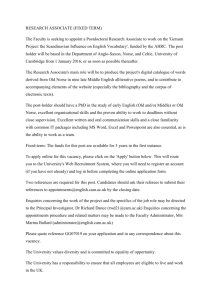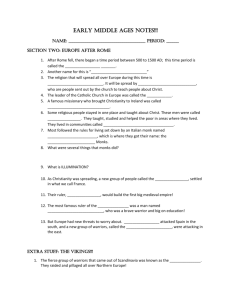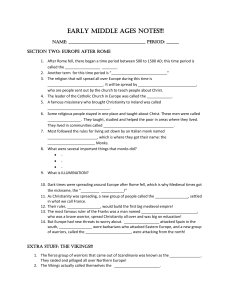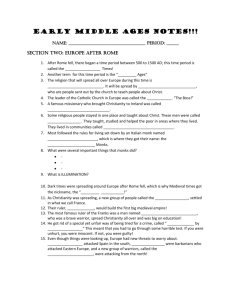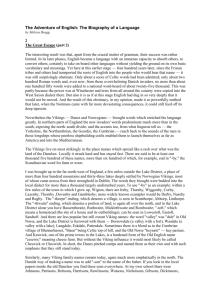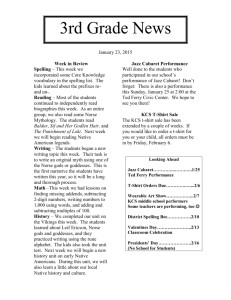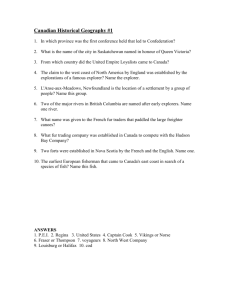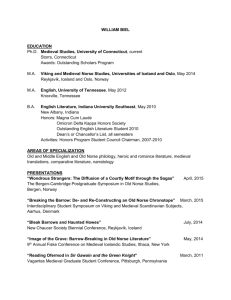Force Majeure Interpretation
advertisement
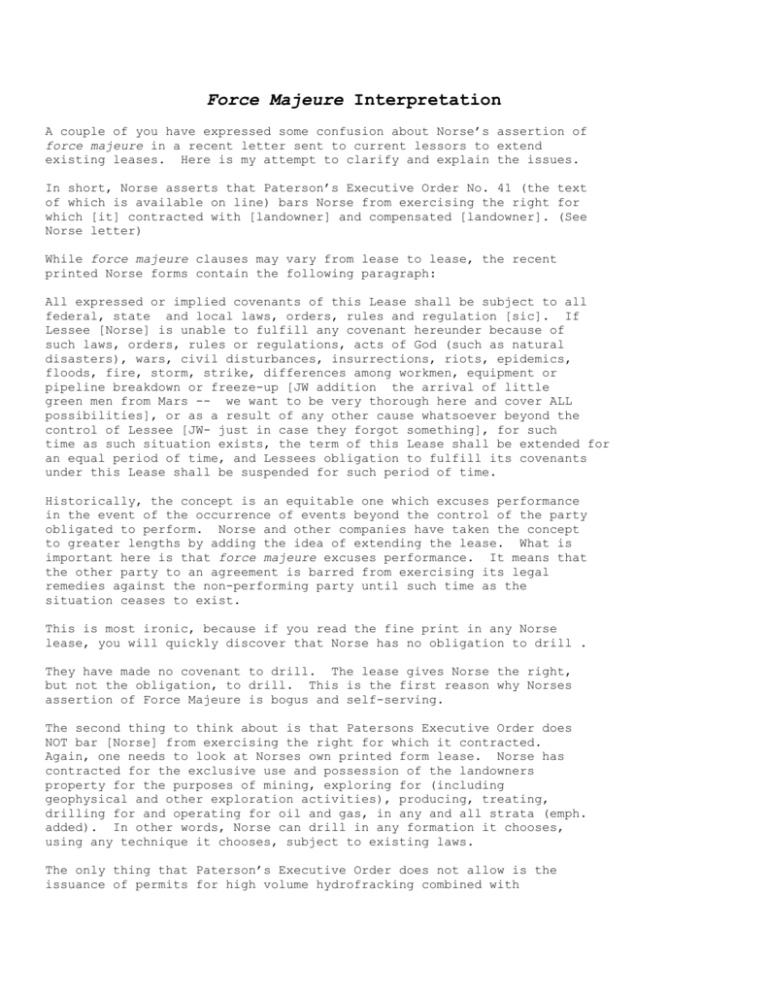
Force Majeure Interpretation A couple of you have expressed some confusion about Norse’s assertion of force majeure in a recent letter sent to current lessors to extend existing leases. Here is my attempt to clarify and explain the issues. In short, Norse asserts that Paterson’s Executive Order No. 41 (the text of which is available on line) bars Norse from exercising the right for which [it] contracted with [landowner] and compensated [landowner]. (See Norse letter) While force majeure clauses may vary from lease to lease, the recent printed Norse forms contain the following paragraph: All expressed or implied covenants of this Lease shall be subject to all federal, state and local laws, orders, rules and regulation [sic]. If Lessee [Norse] is unable to fulfill any covenant hereunder because of such laws, orders, rules or regulations, acts of God (such as natural disasters), wars, civil disturbances, insurrections, riots, epidemics, floods, fire, storm, strike, differences among workmen, equipment or pipeline breakdown or freeze-up [JW addition the arrival of little green men from Mars -- we want to be very thorough here and cover ALL possibilities], or as a result of any other cause whatsoever beyond the control of Lessee [JW- just in case they forgot something], for such time as such situation exists, the term of this Lease shall be extended for an equal period of time, and Lessees obligation to fulfill its covenants under this Lease shall be suspended for such period of time. Historically, the concept is an equitable one which excuses performance in the event of the occurrence of events beyond the control of the party obligated to perform. Norse and other companies have taken the concept to greater lengths by adding the idea of extending the lease. What is important here is that force majeure excuses performance. It means that the other party to an agreement is barred from exercising its legal remedies against the non-performing party until such time as the situation ceases to exist. This is most ironic, because if you read the fine print in any Norse lease, you will quickly discover that Norse has no obligation to drill . They have made no covenant to drill. The lease gives Norse the right, but not the obligation, to drill. This is the first reason why Norses assertion of Force Majeure is bogus and self-serving. The second thing to think about is that Patersons Executive Order does NOT bar [Norse] from exercising the right for which it contracted. Again, one needs to look at Norses own printed form lease. Norse has contracted for the exclusive use and possession of the landowners property for the purposes of mining, exploring for (including geophysical and other exploration activities), producing, treating, drilling for and operating for oil and gas, in any and all strata (emph. added). In other words, Norse can drill in any formation it chooses, using any technique it chooses, subject to existing laws. The only thing that Paterson’s Executive Order does not allow is the issuance of permits for high volume hydrofracking combined with horizontal drilling using the short-cut permitting process allowed by the 1992 Generic Environmental Impact Statement until such time as the existing regulations in the 1992 Generic Environmental Impact Statement are revised and/or supplemented to account for any specific impacts/risks that high volume hydrofracking might pose. There is absolutely nothing in the Executive Order or existing law that would prevent Norse from (i) using existing methods already approved by the Generic Environmental Impact Statement or (ii) complying with existing site-specific SEQRA legal requirements, that is, by preparing and submitting an Environmental Impact Statement for each drilling site for which Norse wishes to obtain a permit. In the first instance, Norse does not WANT to use existing approved methods. In the second instance, Norse has made the determination that compliance with existing SEQRA requirements is not economically viable. (See Norse letter, paragraph 3). In neither case is Norse being prevented from exercising the right for which it contracted much less from performing any obligation it may perceive exists. The Force Majeure argument is disingenuous, at best. At worst, it is a cynical tactic to force people who have far fewer resources than Norse does to spend money to protect their rights. I am advised that the Attorney General’s Office is monitoring Norse’s and other companies’ similar ploys and that, with any luck or justice in this world, a ruling will be forthcoming that protects the landowners. I hope this helps. This explanation can be posted on our site, in conjunction with Norses letter and/or disseminated to any one who you think might find it helpful. This is also pretty much the gist of what I would be saying if you want me to present at the Public Meeting. Let me know if any one has any questions. J Jane Welsh, P.C.

